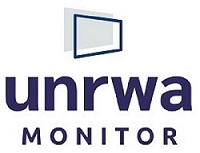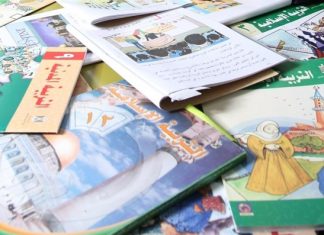The German instigation role of the mass murder of Jews began in the classroom.
Germany, now a democratic power in Europe with peace-oriented policy worldwide, is now the leading donor state to the United Nations Relief and Works Agency (UNRWA) for the 1948 Palestinian refugees and their descendants.
54% of the current UNRWA budget is allocated to education.
The most recent tabulation of donations from UNRWA donor nations was issued on March 14 , 2020. https://israelbehindthenews.com/full-disclosure-who-funds-unrwa/18763/
As such, Gemany shoulders a responsibility to assure the people of Germany that their money is not channeled in a a non-peaceful direction.
One of the best and simplest ways of doing that is checking the attitude of textbooks issued by the PA, and used in UNRWA schools, toward the Israeli/Jewish “other” and to the issue of peace with that “other”.
This subject has already been researched widely and it seems advisable that an effort be made to provide this information to the German reader in his/her own language.
Schoolbooks are the most revealing source of information regarding the values and aspirations a society would instill in the minds of its youngsters. In a state of conflict, they serve as a trustable indicator of the existence, or non-existence, of peace education. The Oslo Accord signed by the State of Israel and the Palestinian Liberation Organization (PLO) in 1993 opened a new phase in the Israeli-Palestinian conflict in which the two parties were supposed to advance towards a peaceful solution to that conflict. In 1994, the Palestinian Authority (PA) was established in areas of the West Bank and the Gaza Strip which, until then, were fully occupied by Israel. The PA assumed most governmental powers in those areas, including education. In 2000 it started issuing its own schoolbooks in a process that lasted until 2006. A newer set of PA schoolbooks was published between the years 2016-2018.
The United Nations Relief and Works Agency (UNRWA) for the 1948 Palestinian refugees and their descendants, which has been operating in the West Bank and the Gaza Strip (as well as in Jordan, Syria and Lebanon) since 1950, uses the PA books in its schools. UNRWA, as a UN agency, is bound by the UN endorsed principle of resolving the Israeli-Palestinian conflict peacefully, as well as by UNESCO principles of peace education (see the Appendix below). Also, as a UN agency, it should treat all member states equally, including the State of Israel.
In my opinion, it would be interesting for the German tax-payer to see whether the PA textbooks used in UNRWA schools (as well as in all other schools in the West Bank and the Gaza Strip) advocate a peaceful resolution of the Israeli-Palestinian conflict or call for an armed struggle, recognize the existence of Israel as a sovereign state in the region and the presence of its six-million Jewish citizens in the country as well as their holy places there, treat Jewish/Israeli individuals as ordinary human beings, renounce terrorist activity against civilians, employ self-criticism in this regard, etc.
All these are sensitive issues not only in the context of Israeli-Palestinian relations, but also against the background of German-Jewish past relations. They dictate, in my opinion, that Germany, more than any other country, should be extra-careful while dealing with issues closely connected to the safety and wellbeing of the citizens of the Jewish State.
***
*Dr. Arnon Groiss is a scholar of Middle Eastern studies holding a Ph.D. degree in this field from Princeton University. He is also a retired journalist from Israel’s Arabic radio station where he served for 42 years. Since 2000 he has been researching the attitude to the “other” and to peace in various Middle Eastern curricula, having examined over a thousand schoolbooks of Egypt, Syria, Saudi Arabia, Iran, Tunisia and the Palestinian Authority (PA). He recently accomplished a four-year research of this issue, having studied 364 PA textbooks of various school subjects in all grades.
***
Appendix: UNESCO Principles of Education for Peace and Tolerance
- Does the curriculum promote tolerance, understanding and respect of the
“other”, its culture, achievements, values and way of life? [1]
- Does the curriculum develop capabilities for non-violent conflict resolution? [2]
- Does the curriculum promote peace? [3]
- Does the curriculum promote international understanding and cooperation?
Does it motivate the student to understand and bear responsibility for the
keeping of peace? [4]
- Is the curriculum free of wording, imagery and ideologies likely to create
prejudices, misconceptions, stereotypes, misunderstandings, mistrust, racial
hatred, religious bigotry and national hatred, as well as any other form of
hatred or contempt for other groups or peoples? [5]
- Is all the educational material (textbooks, workbooks, teachers’ guides, maps,
illustrations, instructional aids) up-to-date, accurate, balanced and
unprejudiced? Does it use equal standards to promote mutual knowledge and
understanding between different peoples? [6]
- Does the curriculum include objective, complete and up-to-date data, as well
as critical analysis of the historical and contemporary factors at the root of the
differences, conflicts and tension between states and groups, as well as ways
to overcoming those differences? [7]
[1] Based on the “Declaration of Principles on Tolerance”, proclaimed and signed by member states of UNESCO on November 16, 1995, Articles 1, 4.2.
[2] Based on the “Integrated Framework for action on Education for Peace, Human Rights and Democracy”, approved by the General Conference of UNESCO at its twenty-eight session, Paris, November 1995, Article 9, and on the afore-mentioned “Declaration of Principles on Tolerance”, Article 5.
[3] Ibid., Article 6.
[4] Based on “UNESCO Recommendations concerning Education for International Understanding, Cooperation and Peace and Education relating to Human Rights and Fundamental Freedoms”, adopted by the General Conference at its eighteenth session, Paris, November 19, 1974, Articles III 6 and IV 7.
[5] Ibid., Articles III 6, IV 7, VII 39, and the afore-mentioned “Integrated Framework”, Article 18.
[6] Ibid., Articles VI 39, X 45 and “the Declaration of Principles on Tolerance”, Article 4.3.
7 Based on the afore-mentioned “UNESCO Recommendations”, Article V 14








